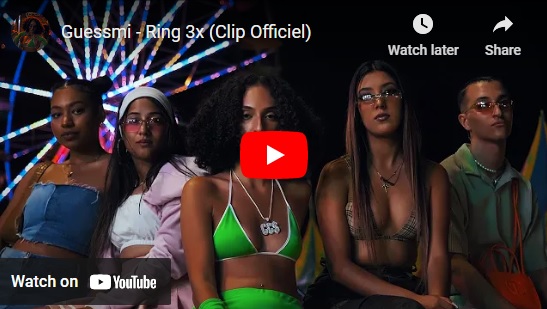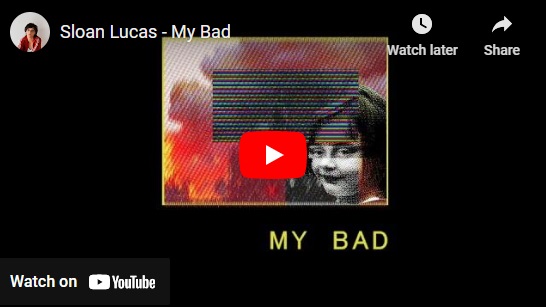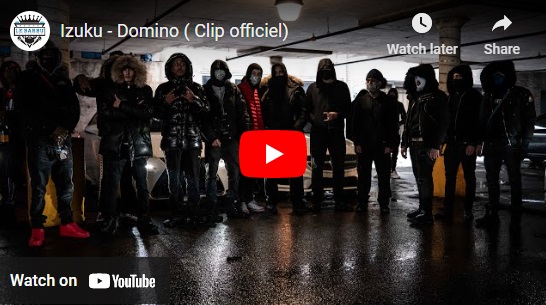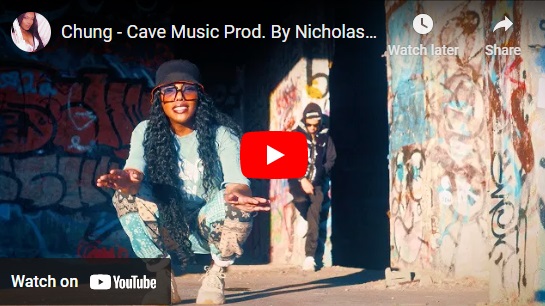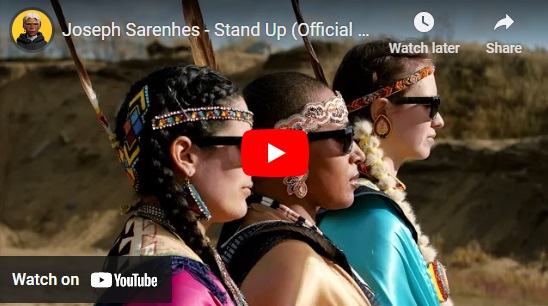Now firmly entrenched as a tradition, here are this year’s Québec rap artists who’ll surely reach a greater audience in the coming 12 months.
Guessmi
“If it becomes work, I’m not down for it,” says Guessmi over the phone. On its own, this sentence says a lot about the artistic journey of the rapper, born in Laval – one of the province’s hotbeds of hip-hop talent for the past few years.
That’s because nothing seems to require Guessmi to expend any kind of effort. It was in late 2019 that the rapper, of Tunisian descent, followed a friend in a studio and went into the booth “just for fun.” She rapidly developed a taste for it. “Before that, I freestyled in chillings. I’d written texts, but I’d never read them out loud,” says the young woman who first became known on Instagram when she published 30-second excerpts from her first studio sessions.
Shortly after, Lebza Khey – a key player on Laval’s rap scene, and founder of the Seiha Studios indie label – heard about the talented young Guessmi and reached out to her on Instagram. “When I hooked up with Lebza and his entourage – Cupidon and Boutot, most notably – I felt like we had a common passion a common goal. We could all go places together. I don’t believe you can go places on your own,” she says, de facto distancing herself from one of the most tenacious myths of American rap: the self-made man/woman myth. “What’s truly important [to succeed], is to charge ahead… and have a solid team.”
Released in March of 2022, Guessmi’s first single, “Rafales,” is a perfect example of her ikewide range of influences – which include French rap legends l Booba and La Fouine as much as stalwarts of American rap of the 2000s and 2010s, like 50 Cent, Lil Wayne, and Nicki Minaj. With her debut EP 45 degrés – a collaboration with now-inseparable Lebza Khey – the 23-year-old rapper reveals an entirely new side of her musical palette, where she lays her harmonious flow over melodically sombre dancehall and Afro-trap rhythms. “My only technique in the studio is to not over-think things. I never want to force my state of mind. I just go with the flow,” she says.,
In 2023, Guessmi will release excerpts from her studio sessions on her socials. “Each session will correspond to a song, and we’ll let the people decide if we release the song or not,” she explains. “Except they won’t really have a choice: they’ll love them for sure!”
Sloan Lucas
Sloan Lucas is a latecomer to rap, having started in her late twenties. “Rap happened at a time where I needed deeper roots,” says the young woman, who was born in Québec’s Eastern Townships, but has lived in Montréal for over a decade.
Her roots previously grew in extreme left-wing activist circles, and in theatrical creation. Splitting her time between Québec and France, Lucas was involved in projects of collective – mostly militant – living arts for a decade. But ultimately, she found collective creations cumbersome. “Collective modes can be exhausting,” she says. “They’re stimulating, but co-ordinating schedules, rehearsals, and political beliefs can be exhausting. I needed to find myself in a more solitary approach.”
To give her artistic process a new impetus, Lucas started writing lyrics, in 2018. Greatly inspired by France’s new wave of rap around 2010, spearheaded by acts like L’entourage and La 75e Session, the rapper used the pandemic to fine-tune her flow and prose. Released in 2020 and 2021 respectively, her first two EPs—Oh Shit OK and Oh Shit Sorry—masterfully reveal her potential, thanks to her smooth flow and biting lyrics. “I might be less militant than I used to be, but I still have that rage in me,” she says.
Although her rap sometimes falls into the standard trap trappings, Lucas keeps her left-field mentality alive, and remains a relative outsider to the local rap scene. “It’s not so much motivated by a desire to remain underground, as by a refusal to be mainstream or famous at all costs,” she says. “But if I can increase my visibility [while respecting my limits and priorities], I’ll do it.”
For 2023, Lucas wants to open her horizons to others, a process she’s begun, alongside Montréal-based producers Ramzi Blue (a.k.a. Bill Noir) and Nicky Savage, who collaborated on Oh Shit Sorry. “I want to start doing more collabs and features,” she says. “The period of isolation I needed to re-centre myself is done. Initially, I thought I could do everything on my own, but now I have a much better idea of what I’m able to do on my own.”
Izuku
Even though he’s only 22, Izuku is already fully self-confident. “There’s no limit to what I can create,” proclaims the Montréal-based rapper. “I listen to all kinds of stuff. What motivates me is getting outside of my comfort zone.”
Izuku’s childhood and teens were defined by his love of words. The artist, with origins in both Martinique and Mali, first became interested in literature while attending a renowned French school in Montréal, before turning to music. After finely dissecting his favourite artists’ lyrics, he began rapping in 2018 alongside a friend. “We created a first sound together, and I played it to people in my entourage,” says Izuku. “It was well received, but I couldn’t get back in the studio! Nothing happened for four months. I didn’t want to be like everyone else… I needed to take a step back.”
His first two full projects – Hagra Vol. 1 and Izuku 2.0 – are the result of that step back. Izuku displays his raw talent through his organic, fluid way of combining singing and rapping. Far from completely leaving behind rap tropes, the winner of the 2020 edition of the rap competition Rentre dans le live isn’t afraid to let his vulnerability shine through his lyrics. “Music defines me,” he says. “I’m not someone who opens up to people in everyday life. I don’t talk about my life to others – I hate that. But through my music, people can discover who I am from another perspective.”
On Pour elle, his latest EP, released in November of 2022, Izuku ponders love and relationships with great lucidity. The creative process allowed him to better understand human nature, and, more specifically, the sometimes deceptive ways in which we present ourselves. “Whether it’s love, friendship or family, I’ve come to understand that we love people because we have a certain perspective on them,” he says. “We [create this idea of a person] based on what we like about them… but that’s not necessarily who that person is [deep down inside].”
Throughout 2023, Izuku will carry on his poetic and musical explorations with a series of singles, culminating with the release of his fourth project sometime before the Summer.
Chung
Chung sure attracts a lot of attention, thanks to her uncompromising flow and hard-hitting rhymes. “I’m the flavour. I’m bringing back the substance, the essence,” says the Lasalle rapper.
She’s doing it with the help of some of the most talented local beat-makers (Cotola, Mike Shabb, Nicholas Craven), who create powerful beats based on very raw sampling, often devoid of any additional rhythmic elements – squarely in the tradition of drum-free hip-hop. Chung’s lyrics express her ambitions as a rapper, as well as her unique artistry. “It’s death to the bimbo rap when Chung step in,” she says, condemning a style of rap that’s more superficial, based on the appearance of the rapper, rather than on what she has to say. “I want to represent the regular Black queens with love and aggression,” she says. “I’m bringing back militancy and a message to this shit!”
Without going as far as saying Chung does militant rap, she energetically embodies her authenticity on her first two projects, Chung Shui (2021) and See You, When I C U (2022). Those two releases are the climax of a decade of exploration, during which the rapper remained rather discreet. Inspired by Chun-Li, a character in the famous video game Street Fighter, her stage name reflects her no-holds-barred attitude and struggle-filled journey. “At first rapping was a form of passing time, freestyling with family and friends,” she says. “I loved flexing my pen and my word game. My oldest brother taught me as a young’un, and I ran with it. Now, here I am.”
Her first Instagram videos in 2019 even earned her a compliment from New York rap legend Havoc, one half of iconic duo Mobb Deep. Later on, figureheads of the recent resurgence of American East Coast rap, like Conway The Machine and Roc Marciano, got in touch after discovering her music. There are worse ways to start a career, to say the least…
Chung will release three new projects in 2023. “More upbeat music. More fly and sick talk,” she says, without any further details, “Art shouldn’t and can’t be explained, though. Just look and learn when the time comes.”
Joseph Sarenhes
Joseph Sarenhes developed his musical identity at a very young age. His Guinean dad and Huron-Wendat mother gave him “a very solid rhythmic base.” Raised amidst powwows and West African music, the Wendake (a reserve near Québec City) native was born “with a djembe in my hands.”
In high school, he followed his professional dancer father’s footsteps and enrolled in a program focused on classical and contemporary dance, while also being a member of hip-hop dance troupes. But at some point, dance was no longer enough. “I don’t want to denigrate that discipline [dance],” he says, “but it just was no longer enough for me. I needed [to express myself more], to get things off my chest. I harboured a lot of frustration… about Indigenous and Afro-descendant peoples and their history in Québec, and in the Americas. . . Changing disciplines came naturally to me.”
It’s with a mission of representing his plural identities, and denouncing the injustices around him, that Sarenhes approaches his music – an R&B-tinged rap that also integrates musical elements from the cultures that nurtured him. After timid beginnings at the end of his teens on home (and very confidential) recordings using GarageBand, the rapper, singer, producer, and multi-instrumentalist revealed himself on “The Burden,” a song he released during the winter of 2021.
Barely a few months later, he launched his first EP, Pride & Chains, created as part of the Échelon project – an initiative co-founded by rapper Webster to develop the careers of artists from the racialized and Indigenous communities of Québec City. That project was home to his anthem “Stand Up,” in which Sarenhes talks clearly about the socio-economic situation of North American Indigenous peoples. “I got a lot of feedback [from that song] and a lot of offers for shows,” he says. “I don’t consider myself to be on rap’s map yet, but that’s the song that got the ball rolling for people to notice me.”
Recruited to compose music for films and stage plays in Québec and the U.S., the 24-year-old artist couldn’t devote much time to his rapping career, and only managed to release two singles, “Staring at Me” and “Bruises.” “But trust, I’ll be back in full force in 2023. I feel much more confident in my art,” says the rapper, a big fan of Tory Lanez and J Cole. “I already have about a dozen shows booked in Québec City and Montréal next summer. I’m lucky, because I can earn a living from my art, even though I haven’t had a hit yet. That’s magic to me.”
